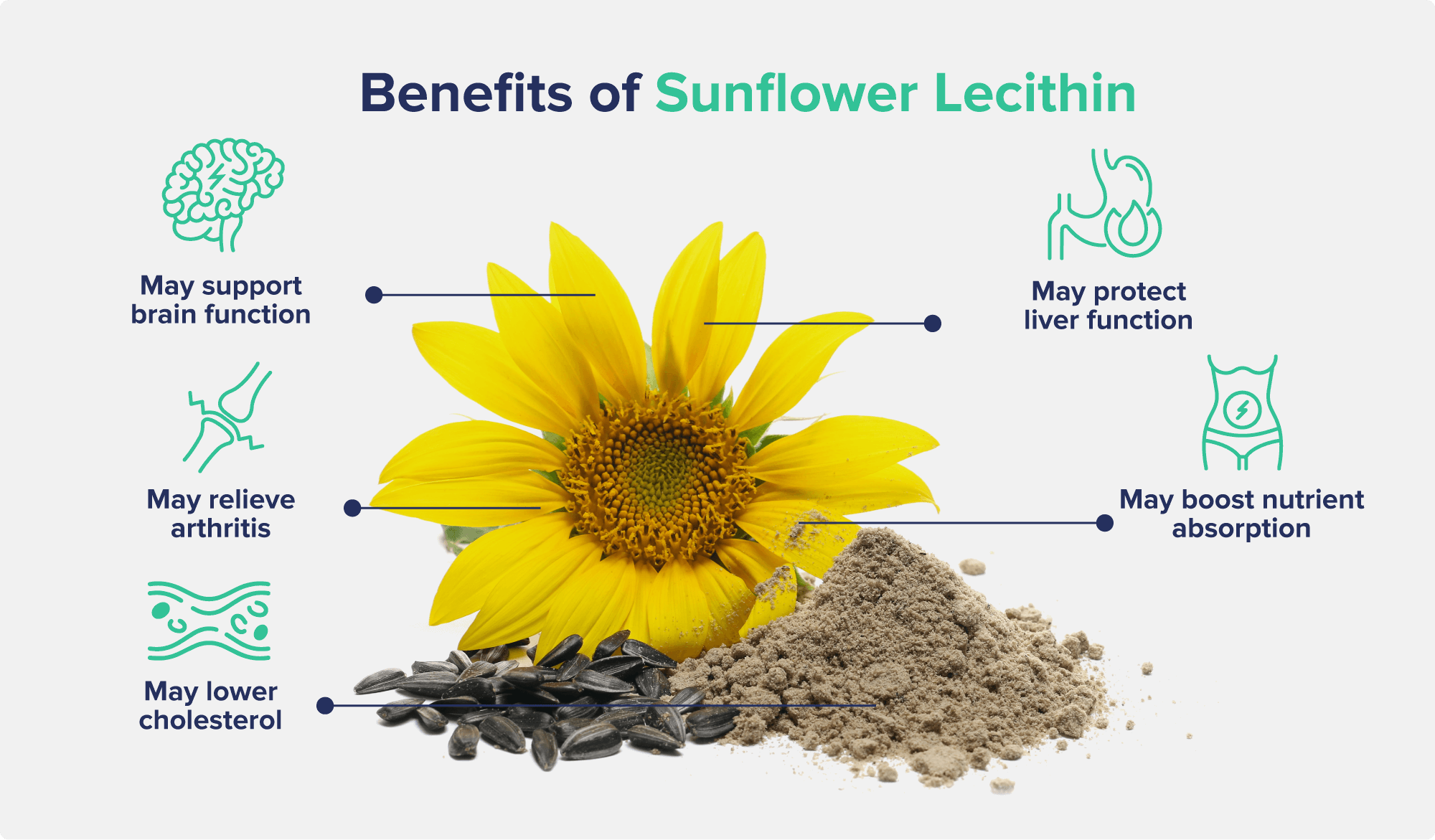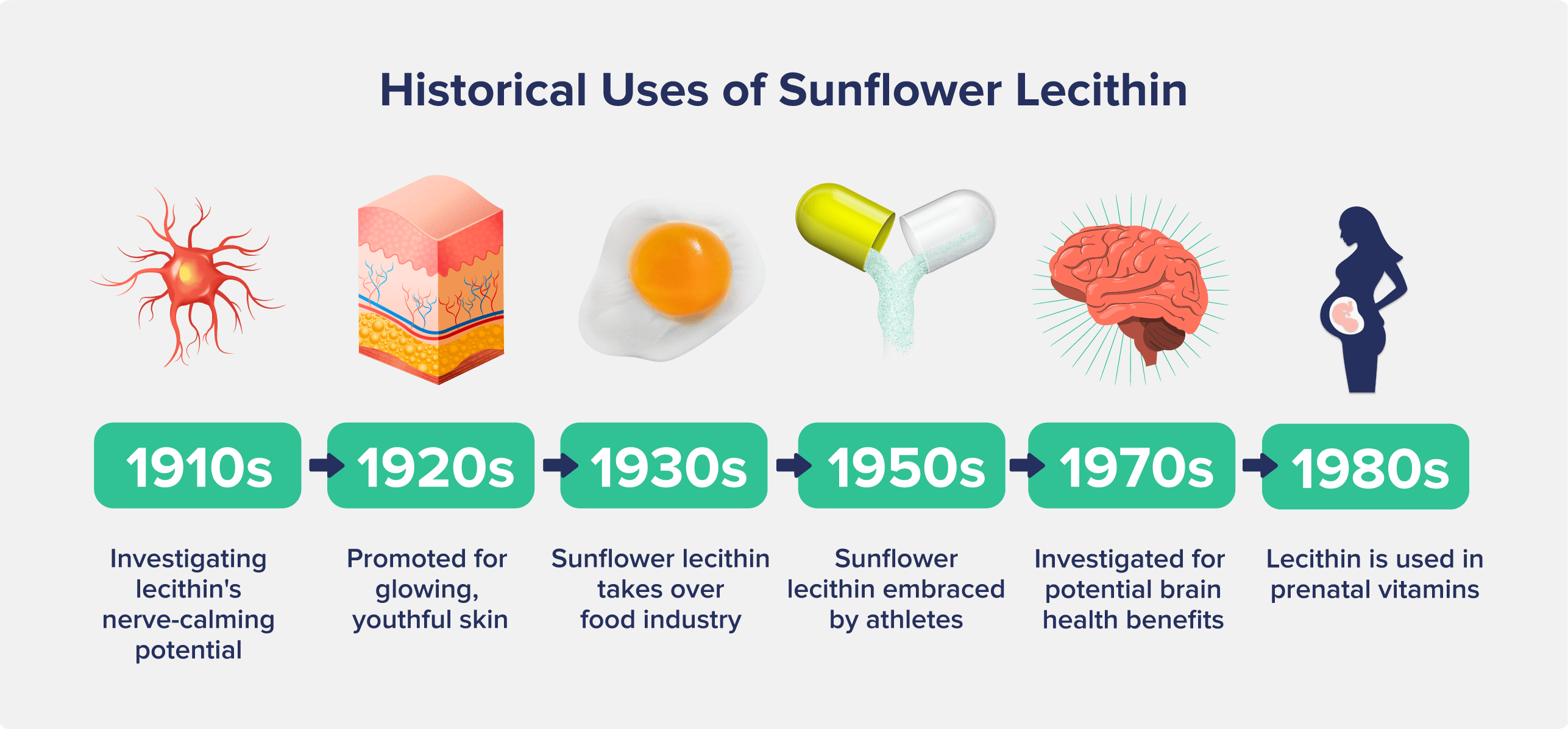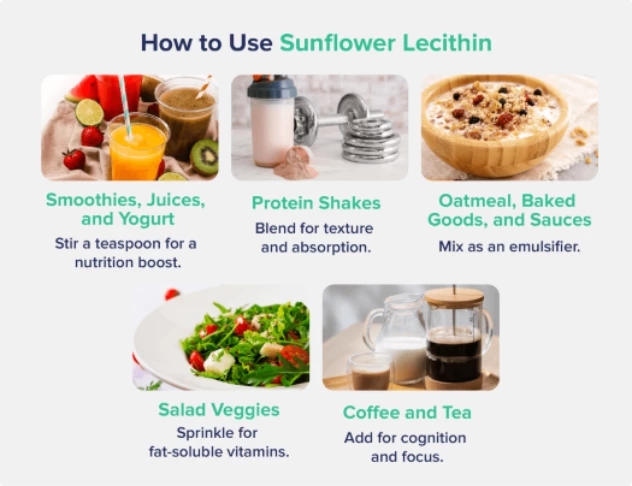Try our favorite, clean protein powder: See our top pick →
Try our favorite, clean protein powder: See our top pick →
This post contains links through which we may earn a small commission should you make a purchase from a brand. This in no way affects our ability to objectively critique the products and brands we review.
Evidence Based Research To fulfill our commitment to bringing our audience accurate and insightful content, our expert writers and medical reviewers rely on carefully curated research.
Read Our Editorial Policy
Sunflower lecithin, a fatty substance derived from sunflower seeds, often appears in supplements for its potentially beneficial phospholipid content (imagine having that word in your spelling bee!).
Early research suggests sunflower lecithin may offer perks like lowering cholesterol, improving cognition, and reducing arthritis pain. As a proven natural emulsifier in food, lecithin also shows the potential to enhance nutrient absorption.
While current findings appear encouraging, experts eagerly await more robust human trials to truly determine lecithin’s capabilities.
For now, it seems tolerated well in moderation by most people, except those with sunflower allergies or sensitive stomachs. In time, with rigorous science illuminating lecithin’s effects, the supple sunflower supplement may bloom into a versatile enhancer of well-being.
According to a fairly broad, but still growing knowledge base, sunflower lecithin has been demonstrated to help lower cholesterol, boost brain power, protect your liver, and more.

Sunflower lecithin spent decades in the shadows as soy protein reigned supreme, but this unsung emulsifier finally stepped into the spotlight in the 1970s when scientists recognized its unique nutritional profile.

The fatty molecules in lecithin attach to cholesterol and escort it out of your body before plaque can form.
The liver also steps up to assist with lowering cholesterol. How does it lend a helping hand, you say?
Sunflower lecithin contains key ingredients that may help your cognitive function, including memory. For example, the essential nutrient choline aids in production of the chemical messenger acetylcholine, which can facilitate memory and many other brain functions.
Limited research shows lecithin is unlikely to be a magic remedy for Alzheimer’s disease. While there are lots of nutrients for brain health in lecithin, studies so far don’t demonstrate major clinical benefits for Alzheimer’s disease. However, in this small study, there were noticeable cognitive improvements in people with subjective memory problems.
Sunflower lecithin has been shown to optimize milk supply and support lactation for breastfeeding mothers. Lecithin acts like a natural fat emulsifier to prevent clogged milk ducts and facilitate breastfeeding. Check out these other ways adding lecithin can help support your breastfeeding journey:
Unlike its soy cousin, sunflower lecithin offers a lower chance of spurring an allergic reaction, making it a safer alternative for many people.
Extensive filtration removes nearly all potential allergens during processing to help avoid allergic reactions, and its phospholipids aren’t known to cause issues on their own. People with soy allergies can breathe easily since non-allergenic sunflower lecithin skips the cross-reactivity.
The only exception is those with a super severe allergy to sunflower seeds—sorry friends, sunflower lecithin is still not your match. However, for most people without sunflower allergies, sunflower lecithin presents minimal allergy risk due to the refined manufacturing process.
Here’s how sunflower lecithin may improve skin health:
These potential benefits may support dewier, softer, and more resilient skin.
In the context of potential gut health benefits, sunflower lecithin has been suggested to:
By supporting smooth digestion, nutrient absorption, and waste elimination, sunflower lecithin (especially organic sunflower lecithin) proves itself as a potentially useful tool for optimizing the delicate balance of the gastrointestinal system in the human body.
Promotes Healthier Digestion
Incorporating sunflower lecithin helps break down fat, escort out wastes, reduces bloating and discomfort, and optimize nutrient absorption.
Improves Gut Health
Sunflower lecithin facilitates several aspects of digestion, thanks to its emulsification ability. Lecithin breaks large fat molecules down into tiny droplets your body can more easily digest. It also binds to cholesterol, preventing buildup and helping to flush it out. The result is smooth sailing through your digestive system without bloating or discomfort. In summary, sunflower lecithin has potential to improve nutrient absorption, waste elimination, and overall digestion.
It’s a battle of the lecithin forms—powder vs liquid! Both rich in beneficial fats, let’s see how these two options stack up, shall we?
Powder is the presiding go-to, often sold in tubs for easy scooping and mixing into foods and drinks. Its fine grains blend seamlessly into anything from shakes to cookie dough.
Meanwhile, liquid lecithin is better for on-the-go use, since it’s bottled up for convenience. This pourable option adds creaminess and emulsifying power with just a few drops.
Powder or liquid, it’s your call to choose the form that suits your lifestyle the best.
Don’t stress—sunflower lecithin plays nicely for the most part when it comes to potential side effects. Adverse effects like occasional digestion issues are among the most common, but are very rarely severe in nature.
Some of the potential side effects of sunflower lecithin might include:
Derived from sunflower seeds, natural lecithin is available in powder or granular form as a supplement and can be added to your recipes to increase nutritional value.
Wondering how you can incorporate it into your daily foods? We’ve got you covered.
Add to coffee or tea to enhance cognition and focus.

If you’re looking to lower cholesterol, enhance cognition, improve athletic performance and recovery, decrease blood pressure, support lactation and milk flow, optimize liver function, and boost nutrient absorption, then this nutritional supplement has important nutrients that could be beneficial for you.
No, Sunflower lecithin is not genetically modified because the lecithin is extracted from non-GMO sunflowers that have not been genetically modified in any way. To double check there is no GMO contamination, brands use an identity-preserved sourcing process that tracks the non-GMO ingredients from seed to finished product.
Sunflower lecithin can be extracted using methods like cold-pressed or solvent extraction. Cold-pressed sunflower lecithin is obtained without the use of heat, while solvent extraction involves the use of safe solvents to separate the lecithin from the seeds.
Subscribe now and never miss anything about the topics important to you and your health.